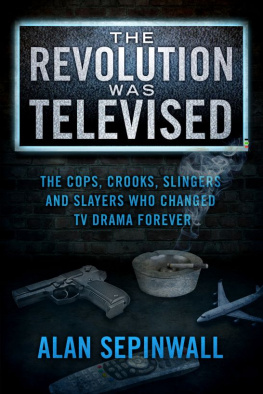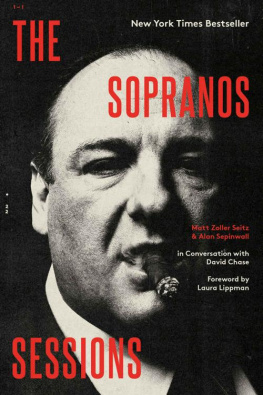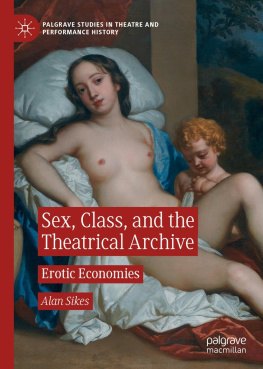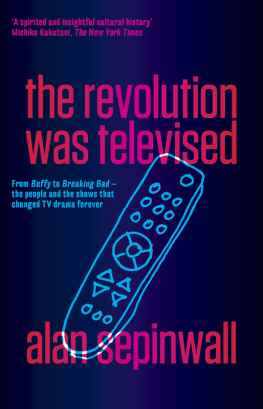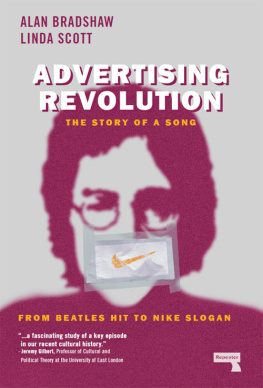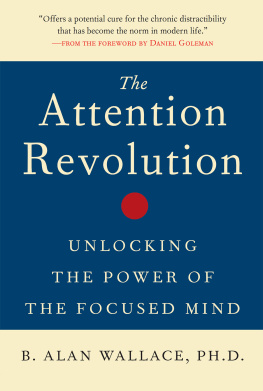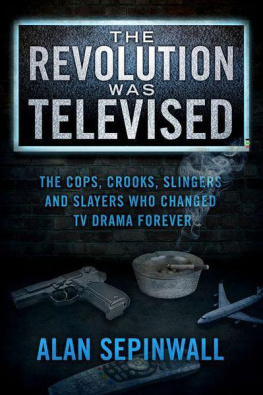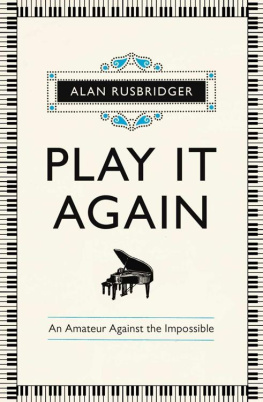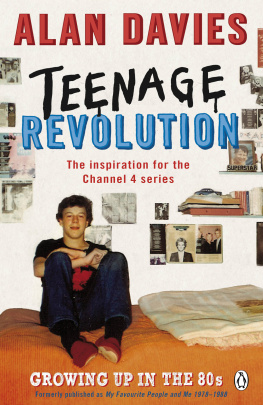The Revolution Was Televised
The Cops, Crooks,
Slingers andSlayers
Who Changed TV
Drama Forever
By Alan Sepinwall
Copyright 2012 by Alan Sepinwall. Allrights reserved.
Smashwords Edition
Smashwords License Statement
This ebook is licensed for yourpersonal enjoyment only. This ebook may not be re-sold or givenaway to other people. If you would like to share this book withanother person, please purchase an additional copy for each reader.If youre reading this book and did not purchase it, or it was notpurchased for your use only, then please return to Smashwords.comand purchase your own copy. Thank you for respecting the hard workof this author.
This book is dedicated totwo people I dearly wish were still here to read it:
Dr. Jerry Sepinwall, whoalways encouraged my love of reading and writing.
David Mills, who gave me myfirst peek behind the curtain.
Table of Contents
Introduction
And they pay you forthis?
Once upon a time, any conversation Ihad with a stranger about my job as a television critic led to thatquestion. Some were amused that this was the way I made my living.Others were disdainful, insisting that they didnt watch muchtelevision (or even own a TV). More often than not, theconversation would hit a dead end when I said that I didnt alsowrite about movies.
But if my job didnt makesense to these strangers, it made perfect sense to me. I hadstumbled onto the best gig in the world. I was being paid to watchtelevision. I was, of course, also being paid to write about television,which not everyone could do, and there were times where it wasntso much that I got to watch television for a living, but that I had to watch it (wherehave you gone, Homeboys From OuterSpace ?), but overall, it was a dream cometrue.
It was a dream I had falleninto by continually being in the right place at the right time forsomeone with my interests. I matriculated at the University ofPennsylvania with the first class of non-engineers to receive anemail address and a Unix shell account, and I began using both towrite obsessively about NYPDBlue , first on Usenet, then on a website Iset up on the campus server (where it still sits, a monument tocutting-edge web design circa 1994). Online reviews of anythingwere still a novelty when I graduated in 96, and that websitehelped me land a features internship at The Star-Ledger of northern NewJersey my hometown newspaper in a summer when the paperslongtime TV critic couldnt make it to the TV critics press tour inLA. My editors gambled on sending me in his place, I didntembarrass myself, and they offered me a full-time job as theback-up TV writer. In college, Id been told I would beextraordinarily fortunate to land a full-time job as anentertainment critic at a small paper within five years; Id luckedinto one at a big paper within five weeks.
Even better, it seemed likethe best time in entertainment history to be a television critic.From where I sat, TV was in the middle of another golden age,filled with smart comedies and, more importantly, dramaslike NYPD Blue and Homicide that I felt tapped into what I had seen for years as thelimitless potential of TV storytelling. I loved movies, but Idalso seen in shows like Hill StreetBlues and St.Elsewhere that the small screen had certainadvantages over its bigger, more prestigious cousin. It could tellvery long stories. It could allow characters to grow over extendedperiods of time. And by coming into my home rather than making mego to it, it could forge a more intimate bond with me. As I grewup, very few shows were willing or able to exploit those advantagesto the fullest, but by the time I arrived at The Star-Ledger , more and more werefiguring it out.
I was, I said to myself often,privileged to be covering a medium that had become as good as I hadalways dreamed it would be that was, possibly, as good as itcould ever possibly be.
I was wrong.
I thought I had seen the TV universeat its most vast and impressive. Instead, I was about to witness abig bang of sorts, one that would greatly expand the boundaries ofthis universe, and the way we viewed it.
I was about to see The Sopranos .
I was about to see Oz . The Wire . Deadwood . The Shield . Lost . Buffythe Vampire Slayer . 24. Battlestar Galactica. FridayNight Lights . MadMen . BreakingBad .
I was about to see television achieveits full potential, and step out from the shadow of thecinema.
I was about to see arevolution.
And the revolution began not just withthe talented creators of these shows television had, after all,been no stranger to creative geniuses, going back to Rod Serlingand Paddy Chayefsky but with dynamic shifts in the televisionbusiness itself, and in the many ways people watched TV.
When I started at the Ledger in the summer of1996, you had the broadcast networks, and then you had everyoneelse. (And within the network universe, Fox had only begun to betreated as anything but a novelty; the WB and UPN were runtsfighting over table scraps.) HBO had a few original comedy seriesand its movies, but if you wanted scripted television, you mostlywent to ABC, CBS, NBC, and occasionally Fox.
A few years before, Bruce Springsteenhad put out a song called 57 Channels (And Nothin On), whosetitle became almost instantly dated on both ends. Soon, everyonescable package was ballooning way past 57, and channels that hadbeen satisfied airing nothing but reruns and old movies beganputting on their own original programming and the mass audiencethat had been the bread and butter of television began to fractureinto a group of ever-smaller niches.
Commercially, this presenteda huge problem for a business built on a big-tent philosophy, whereyou succeeded with the broadest, most palatable, least challengingwork. Creatively, though, the fragmented audience was the bestthing that could have happened to television. Certainly, somecorners of the TV business leaned heavily on programming that wasas broad and/or cheap as possible (the year after The Sopranos , Survivor set off thereality TV boom). But many smart executives realized that theycould do very well making shows those smaller audiences would carepassionately about. You can make money on a show watched by threemillion people, if theyre the right three million people, payingclose attention.
Many of these shows came from veteranproducers still stinging from mistakes made in past projects.Often, these modern masterpieces were first written under theassumption that no one would ever see them. That combination ofregret and abandon led to a wave of bold and exciting new dramasthe likes of which TV had never seen before.
And as The Sopranos was followed by The Wire, The Shield , andall the rest, an interesting role reversal happened with the moviebusiness, which was dealing with some audience uncertainty of itsown. Where once there had been blockbusters, art films, and a largeswath of movies in between many of that last group geared toadults the 21st century slowly saw the extinction of themiddle-class movie. If a film couldnt either be made on the cheapor guarantee an opening weekend of $50 million or more, it wasout.
As Sopranos creator David Chase whoonce upon a time wanted nothing more than to get out of the TVbusiness and write films puts it, Movies went from somethingreally interesting to what we have now.
TV stepped in to fill that void. Ifyou wanted thoughtful drama for adults, you didnt go to themultiplex; you went to your living room couch.
The rise of this movementcame at the perfect technological time, as DVRs, On Demand, andespecially DVD box sets and video streaming made it easy for peopleto catch up on that great-but-complicated new show theyd heard somuch about. (DVDs allowed fans to turn their friends onto newdiscoveries the way rock fans used to pass around albums from theirfavorite up-and-coming new band.) And the spread of the internetinto every corner of modern life made it easier to discuss and makesense of shows that might have seemed too challenging back in theday, whether you were trying to solve the mysteries of Lost or understand whatTony Sopranos dreams meant.

